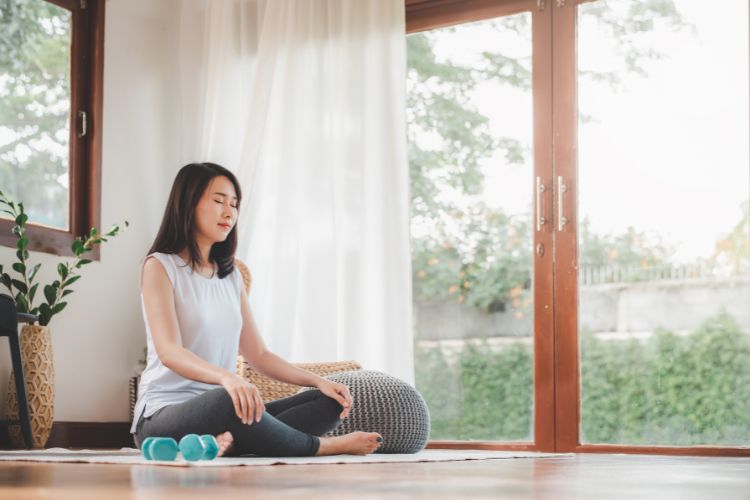Having a routine—whether it’s a structured schedule or simply a set of intentional habits—plays a major role in supporting your overall well-being. According to Northwestern Medicine, routines offer several important benefits:
- Improved physical health. Achieved through consistent habits such as regular exercise, balanced nutrition, and wellness-focused planning.
- Better sleep and increased productivity. Supported by steady sleep routines and effective evening wind-down practices.
- Lower stress levels. Maintained by incorporating daily stress-reducing techniques into your schedule.
- Increased motivation and self-esteem. Built by staying focused on goals and gaining confidence through routine and achievement.
That said, having a routine or preferred daily rituals doesn’t mean you need to follow a rigid, unchanging script every day. Life is unpredictable, and too much rigidity might add stress rather than help you manage it effectively. The goal is to build a framework that gives your day meaning and direction—one that’s flexible enough to adapt when life throws you a curveball, but stable enough to support your mental and physical health.
Why Having a Routine Is Good for You
Having a daily recovery practice you can count on helps provide an element of stability, which helps you build better resilience and improve emotional regulation.
In an article for Headspace, clinical psychologist Dr. Steve Orma points out that “routine helps with stress. Create a set schedule for doing chores, work tasks, meetings, exercise, paying bills, and all the usual things you need to do. Put these into your schedule. Once this becomes your normal routine, it’s easier to accomplish everything, because it becomes habit.”
He’s also a strong advocate for carving out some “thinking time” into each day to “think through any problems or worries weighing on you instead of letting them build up.”
How Is a Ritual Different From a Routine?
This is an activity that holds special meaning for you or serves a specific purpose in your life. While the word “ritual” is often linked to religious or spiritual practices, another definition is “a way of doing something in which the same actions are done in the same way every time.” In that sense, ritual sounds quite similar to a routine, doesn’t it? The key difference lies in the intention behind it: routines are usually practical and goal-oriented, while rituals carry deeper personal significance and are performed with a clear, intentional purpose.
In an article for The Chalkboard, Deepika Chopra suggests we need rituals for various reasons, including:
- As a form of necessary daily ceremony, whether spiritual or not, to “boost physical and mental well-being.”
- To serve as a reminder of “what we actually care about and keep us in close proximity to our purpose.”
- Make it easier to stay grounded not only in life but also with our core values and their meaning.
Chopra adds that “rituals increase confidence, provide us with a sense of security, alleviate the weight of grief, and help reduce anxiety. And, above all, rituals are a sure-fire way to increase happiness.”
Can all routines become significant rituals? Not necessarily, as that level of existence might be hard to maintain. But within the guidelines of your recovery routine, you can certainly establish a few key rituals that matter. If you’re curious about how to do it, these books might offer some insight:
- The Power of Ritual by Casper ter Kuile
- The Rituals: Simple Practices to Cultivate Wellbeing, Deepen Relationships, and Discover Your True Purpose by Natalie MacNeil
- Reverence: Creating Ritual in Modern Life by Christine Marie Mason
- Rituals for Every Day by Nadia Narain and Katia Narain Phillips
Ideas for Structuring a Daily Routine
Ready to get started? Try these suggestions from Goalcast.
- List your daily tasks. Include everything from small tasks, like brushing your teeth or showering, to larger responsibilities, such as preparing meals, exercising, or getting kids ready for school.
- Identify your peak energy times. Pay attention to when you feel most focused or energized, and plan to tackle important tasks during those periods.
- Design a routine that works for you. Base it on your goals, recovery objectives, wellness priorities, and ways to streamline key responsibilities.
- Start your day with purpose. Choose a task that excites you or connects to your passion. This practice builds motivation and helps you stay consistent.
- Use the 30 minutes before downtime wisely. Do light organizing, prep for the next day—like setting out clothes or packing lunches—and add something enjoyable, such as listening to music or a podcast.
- Wind down with a calming bedtime routine. Include quiet activities like meditation, reading, or turning off screens to help promote better sleep.
On average, it takes about 90–120 days to make routines habitual. Keep track of what’s working and what needs to be modified, and be flexible about the process. Recognize that even if everything implodes today, you can pick up the fragments and start fresh tomorrow.
Explore More Opportunities for Wellness at Great Oaks
Our core philosophy at Great Oaks Recovery Center outside of Houston, Texas, is to help you achieve your best emotionally, mentally, physically, and spiritually. As a premier addiction rehabilitation and dual diagnosis treatment center, our board-certified professionals design individualized treatment plans that help you maximize your potential for whole-person health. If this is the treatment approach you’ve hoped to find, call our admissions office today to learn more.



